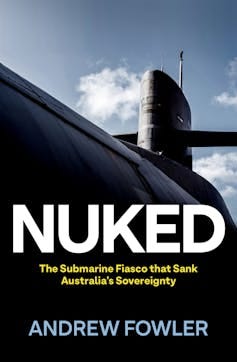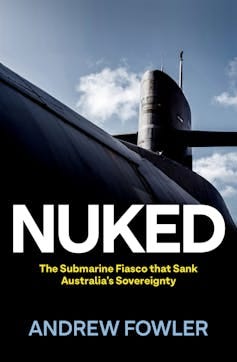Australia's AUKUS submarine deal has been exposed as a Monumental Folly
Mark Beeson, University of Technology Sydney
Nautical metaphors are irresistible, I’m afraid, when talking about Australia’s seemingly endless submarine saga. But as investigative journalist Andrew Fowler makes clear in Nuked: The Submarine Fiasco that Sank Australia’s Sovereignty, his excellent and excoriating analysis of the genesis of the AUKUS pact, there isn’t much room for levity otherwise.
Anyone who doubts the accuracy of former Labor luminaries Paul Keating and Gareth Evans, who have argued that AUKUS is, as Keating put it, “the worst deal in all history”, really ought to read this book.
Review: Nuked: The Submarine Fiasco that Sank Australia’s Sovereignty – Andrew Fowler (Melbourne University Publishing)
The plan for Australia to acquire eight nuclear-powered submarines, built locally in partnership with the United Stated and the United Kingdom, is projected to cost up to A$368 billion. But it is not just the cost of the AUKUS project that is astounding.
While many people should hang their heads in shame, the principal architect of this monumental folly is Scott Morrison, whose reputation will be deservedly further diminished by the revelations contained in Fowler’s carefully researched volume. One question the book does not address in detail is the abysmal quality of political leadership in this country, especially, though not exclusively, on the conservative side of politics.
Whatever the reasons for this, the end result was that
the huge shift in Australia’s foreign policy alignment was hatched by a Christian fundamentalist former tourism marketing manager with no training in strategic or foreign affairs but a great gift for secrecy and deception.
The shift in question was the decision to abandon an agreement to buy much cheaper, arguably far more suitable and deliverable submarines from France, with the aim of “welding Australia’s military to the United States”. In retrospect, it is hard to believe how badly the French were misled, or how shortsighted the rationale for the switch actually was.
In Fowler’s view, buying the French submarines would have been a “remarkable achievement”. It would have given Australia “greater independence and a more influential position in the world”.
Properly explaining Australian policymakers’ fear of strategic and foreign policy independence would take another book. But what clearly emerges from Fowler’s account is how irresponsible and self-serving Australia’s approach to national security became under Morrison. The fate of the Australian people, not to mention the endlessly invoked “national interest”, was of less concern than short-term political advantage.
“The fact that the increasing US military presence in the Indo-Pacific could draw Australia into a conflict,” writes Fowler, “seemed of little consequence in Morrison’s desire to wedge Labour on national security.”
Of course, being painted as “weak” on security, and the US alliance in particular, was the stuff of nightmares for the Australian Labor Party. It still is. Consequently, the ALP’s leadership has gone to extraordinary lengths to try and convince voters, and its own increasingly sceptical rank and file, that not only are they equally committed to national security, but that the AUKUS agreement is the best way of achieving it.
High costs, significant risks
Given AUKUS was the brainchild of a discredited conservative prime minster who, Fowler suggests, “believed he was on a divine mission”, one might have hoped the Albanese government could have at least conducted a perfunctory cost–benefit analysis. AUKUS is the largest single military acquisition the nation has ever undertaken, after all. Recent defence acquisitions have become known for massive cost blowouts and failures to operate or arrive in the advertised manner.
But the Labor Party has not only walked into Morrison’s trap; it has willingly, even enthusiastically, “embraced a decision taken after a deeply flawed process”. Even more consequentially, as Fowler points out, “with the major parties in lockstep on AUKUS, the most complex and expensive spend in Australian military history would never be publicly investigated”.
At the very least, this is an astounding failure of good governance and accountability. Perhaps even more remarkably, it also demonstrates a singular lack of political judgement, driven by short-term political concerns rather than long-term strategic interests.
“Labor lost the one chance it had to identify itself as independent and courageous and put the interests of the country ahead of its understandable desire to win government,” argues Fowler. “The consequences of the fear that drove the ALP leadership to embrace AUKUS with barely a second thought will haunt them for years to come.”
Serves them right. When there is little discernible difference between the major political parties on issues of profound national importance, voters – especially the younger variety – may understandably despair about their futures.
Even if we put aside the fragile, unpredictable and polarised nature of US politics, it is not too controversial to suggest that the US alliance has some potential frailties and significant costs. Not the least of these is fighting in wars that have no obvious strategic relevance to Australia.
AUKUS will further complicate Australia’s relationship with China, our major trading partner. But it carries other significant risks. This not just because, as Opposition Leader Peter Dutton says, it is “inconceivable” that we would not fight alongside the US in any conflict with China over Taiwan.
If the naval base at Garden Island, just down the road from me off the coast of Fremantle, is not already a nuclear target, it assuredly will be once US and UK nuclear-powered submarines routinely operate from there. Whether my neighbours realise they risk being vaporised as part of our commitment to the alliance and a “great nation building project” is a mystery that has not been explored.
Local politicians, universities and defence representatives certainly recognise the short-term benefits that may flow from new investment. But this means there is likely to be next to no informed debate about, much less opposition to, the AUKUS pact, no matter what the ultimate costs may be for a nation that can’t even provide adequate housing for its own people. Indeed, the lack of debate, not to say outrage, about the sheer cost of the AUKUS project is perhaps the most remarkable feature of the sorry submarine saga.
And that is before we get to the growing doubts about the reliability, deliverability or strategic relevance of nuclear-powered submarines. Perhaps people find technical discussions stupefyingly dull or incomprehensible. Perhaps they don’t realise that if we spend all that money on submarines, not only will our sovereignty and capacity to act independently be significantly eroded, as Keating and Malcolm Turnbull have claimed, but we won’t be able to spend the money on more immediate and tangible threats – repairing our rapidly degrading natural environment, for example.
I am not convinced Australia needs to buy any submarines. This will no doubt strike those in Canberra’s strategic bubble as heretical, ill-informed and irresponsible. But it is noteworthy that our overall security did not seem to suffer while the ageing Collins class submarines were unavailable for four years.
Even those with widely respected expertise in such matters, such as Hugh White, have cast doubt on the feasibility of AUKUS. White has written that “long delays and cost overruns are certain. Outright failure is a real possibility.”
Drunken sailors
Fowler has produced quite the page-turner for a book on strategic policy. His account provokes occasional gasps of disbelief, especially about the conduct of the Morrison government and its coterie of carefully chosen, like-minded advisors, many of them from defence companies likely to benefit from government spending.
Many former Morrison ministers – as well as Morrison himself – have exited through the revolving door between government and business to take up lucrative positions in the defence industry. Who would have thought?
Nuked is worth a close reading to see how Fowler arrives at his damning conclusion:
the level of incompetence in the government of Australia was breathtaking, as were the repercussions. The United States would be calling all the shots on what kind of submarines would be sold to Australia, how old they would be, how many there would be, when they would be delivered, and even if they would be sold at all.
It was to be expected that Washington would act in its own best interests. What is extraordinary is the possibility that Morrison truly believed that what was best for the United States was best for Australia. Just as extraordinary is the fact that the Labor Party, perhaps fearful of history embraced the deal that made Australia so vulnerable, undermining its independence and sovereignty.
Another nautical metaphor about spending like drunken sailors comes to mind. It wouldn’t be quite so galling if the nation’s political leaders weren’t using our money or were motivated by something other than short-term political advantage or the fear of being wedged.
The good news, perhaps, is that it is difficult to imagine the nuclear-powered submarines will ever arrive. The bad news is we will still have to pay the Americans and the British to prop up their overburdened and underperforming shipyards in the meantime. With friends like these, who needs to make new enemies?
It beggars belief that a country with unparalleled geographical advantages and no obvious enemies thinks it is a good idea to spend $368 billion on offensive military capabilities, which may or may not work or be delivered. Nuked explains how this situation came about. But we may need to ask psychologists why our political leaders have turned us into what the diplomat Alan Renouf famously called a “frightened country” and allowed such follies to flourish.
Mark Beeson, Adjunct professor, University of Technology Sydney
This article is republished from The Conversation under a Creative Commons license. Read the original article.
Click image to buy on Amazon






